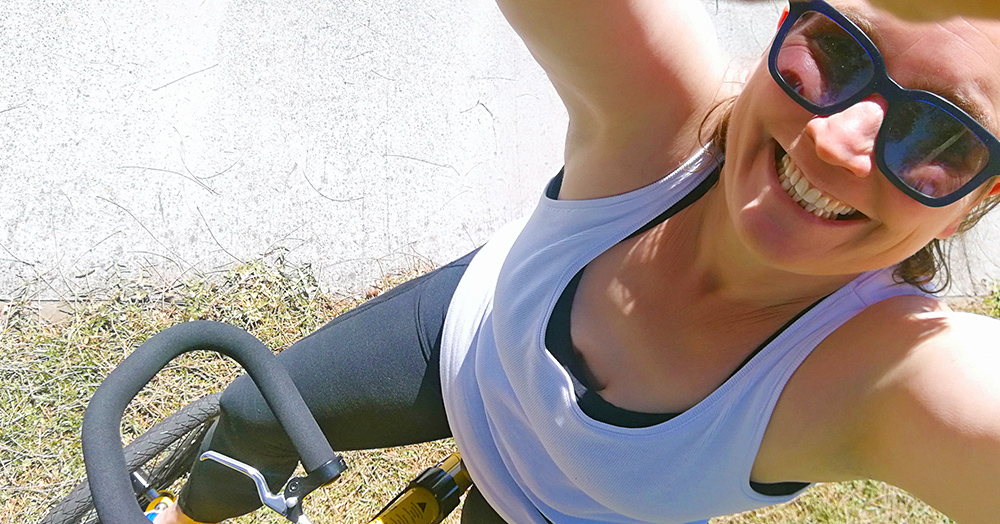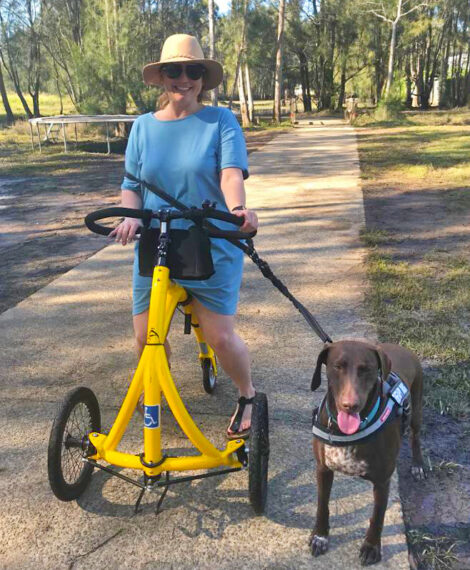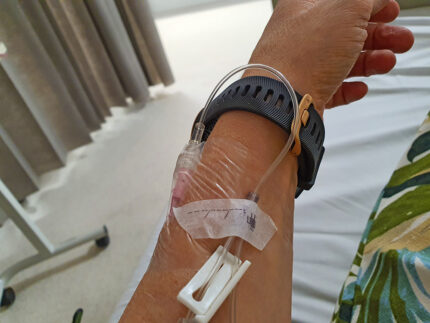Jo Mohan has lived with psoriasis since she was a baby. Now 41, she works full-time and runs a peer support group.... Read more >

Brigitte Sigl: My life with MS and choosing to be vaccinated
Brigitte Sigl: My life with MS and choosing to be vaccinated
by Rosemary Ainley, 6 September 2021
Brigitte Sigl is an active 47-year-old living with multiple sclerosis (MS). She thought long and hard before deciding to be vaccinated for COVID-19. She was worried it might trigger a relapse of her MS. “I had quite a few years with relapses every three months, not walking, not talking and on bursts of steroid medications. Finally, I’m on a good run. Then I thought this is the time I should do it because my body is strong.”
The Australian and New Zealand Association of Neurologists and MS Research Australia COVID-19 vaccination guidance for people with MS states there is no current evidence to suggest that COVID-19 vaccines could trigger a relapse of MS symptoms.

The guidance document also states, “A person with multiple sclerosis is no more likely to develop COVID-19 or its complications (than the general population) … (However), those with secondary progressive MS and higher levels of disability may be at increased risk of complications from COVID-19”. Therefore, it is highly recommended that all people with MS get vaccinated for COVID-19.
About multiple sclerosis
Multiple sclerosis is an autoimmune disease that affects the central nervous system. The condition causes damage to the protective sheath that surrounds the nerve fibres in the brain and spinal cord. The damage creates scars or lesions on the nerves that stop them from passing on signals correctly throughout the body.
In Brigitte’s words, “The nerves are like wire cables that connect to your brain. As they get damaged, they fray or get burnt which causes ‘dots’ or blockages”. “The cable connections are no longer intact so the messages can’t get through as quickly anymore or, sometimes, they can’t get through at all,” she continued.
MS has no single, specific cause. It occurs when the immune system overreacts to foreign cells such as bacteria, viruses or fungi and begins to attack healthy cells as well. Other autoimmune conditions include type 1 diabetes, rheumatoid arthritis and lupus. It is common for people to develop more than one autoimmune condition over time.
Autoimmune conditions can be triggered by environmental factors, stress and trauma or genetics. Many people with MS have a family history of autoimmune diseases. Brigitte has several family members with the condition, so she was well aware of it. Even so, it wasn’t until 2017, nearly 10 years after the onset of her first symptoms, that she was diagnosed.
There is currently no known cure for MS although there are treatment options. Treatments can include medications to manage the symptoms and (when appropriate) to suppress the immune system. Exercise, physical therapy and a balanced diet can also help manage symptoms and daily living with the condition.

Multiple sclerosis affects the whole body
MS affects people in different ways, depending on the location, quantity and severity of the nerve lesions. Brigitte experiences loss of sensation around her body at various times. In her case, the numbness is not painful but for others it is.
A common MS symptom Brigitte sometimes experiences is known as “foot drop”. Disruption in the nerve pathway can make it difficult to lift or put weight on the feet. They can drag or catch on stairs and uneven surfaces causing the person to trip.
“My legs don’t always work”, said Brigitte. “I sometimes need mobility aids. At the moment, I feel really good but I never know if I’ll wake up and need my wheelchair. I need a shower chair sometimes because I can’t stand up in there.”
Multiple sclerosis also affects Brigitte’s speech and sight. “I sometimes can’t talk. I try, but it doesn’t come out properly. That’s very frustrating because I know what I want to say, but the connection doesn’t work”, she said.
“My vision can sometimes be impaired. I get auras, little circles spiralling. I cut myself a lot when I try to chop veggies so I get told off for doing that. That’s partly because I get numbness in the fingers and partly because I can struggle to move my arms the way I want,” she added.
Brigitte had to resign from her job as an interpreter for the health system as MS affects her cognition. “I had trouble finding the right words. I chose to resign as it wasn’t safe for the patients and doctors for me to do that job”, she said.
These days, Brigitte is an active patient advocate and chairs several local and state health committees.
Deciding to receive a COVID-19 vaccine
Being able to one day visit her family overseas with relative safety again was a strong factor in Brigitte’s decision, as was her location. “I live on the central coast of NSW and there are cases and exposure sites within a few kilometres from my house so I was keen to get vaccinated. Plus, with the surge of cases in NSW, I think it is a wise decision for me to be vaccinated. Even though I am very strong and healthy at the moment, I’m still 47, I have MS and asthma, I don’t know what COVID would do to me, so I’d rather take the shot.”
A lot of people encouraged Brigitte or asked “Why aren’t you vaccinated yet?” Others said, “Why would you do that to your body? I’ll never get vaccinated.” But she thought “It’s my body. It’s my decision.” I made a conscious decision and read, not just Facebook things, but medical reviews and studies from around the world.”
Brigitte spoke to her medical team before deciding to be vaccinated for COVID-19. Overall, they were pro-vaccine but her GP stressed that it was her decision. She also discussed it with her friends and family. “One of the telling things came from my aunt in Germany, who has MS herself. She had the same vaccine as me without a problem so that was reassuring for me. Most of my MS friends had no issues apart from things like the sore arm and headache that many other people get.”
Getting a vaccination appointment
Brigitte used the COVID-19 Vaccination Eligibility Checker website soon after it was launched and learned she would be eligible for vaccination in the initial Phase 1b of the rollout. She found that process easy but thought it would be harder for people who are not computer literate.
Brigitte admits she was uncertain about the AstraZeneca vaccine, however, as she volunteers at her local hospital she was classed as a hospital employee. This enabled her to have her vaccinations at the Pfizer clinic there.
Accessing clinics, even in hospital settings, can be problematic for many. Brigitte noted that the cost of parking can be prohibitive but free parking areas are often too far away for people with mobility issues. “Even though you are doing something good for the community to protect yourself and others, you still have to pay for parking,” she said.
(Note: Some people with chronic health conditions or disabilities can access subsidised taxi fares through the National Disability Insurance Scheme (NDIS), the Mobility Allowance from Centrelink or through the taxi transport subsidy program in their state.)
On the day of her first vaccination, Brigitte said she was, “Very, very, very scared beforehand but the nurse was very, very, very nice”. “She asked if I was sure I wanted to have it but I was there so I wanted to go ahead. She also went away and checked with the doctor. She made me feel at ease so I said, ‘Just whack it in!’”
“I had an EpiPen with me as I sometimes have allergies, but they kept a close eye on me afterwards and I was fine. All I felt was a headache for a day or two afterwards and Panadol was enough to manage that”, Brigitte added.
MS medications and the timing of COVID-19 vaccinations
Brigitte is not currently on any MS medications. She was on a six-monthly infusion called ocrelizumab (Ocrevus®) for nearly two years. Ocrelizumab is a disease-modifying anti-rheumatic drug (DMARD) that works by suppressing the immune system, however, it can also leave users more prone to infections.
“Many of my friends are still on that, but I chose to stop as it didn’t help my MS. I still had relapses (disease flares) at the same rate as before”, says Brigitte.

MS Australia gives the following advice regarding the timing of some MS medications around COVID-19 vaccination doses.
“For those on intermittent immunosuppressive therapies (e.g. ocrelizumab, alemtuzumab, cladribine) it would be sensible to ensure that your vaccinations are completed several weeks prior to your treatment and avoid being vaccinated for several months afterwards. This is in order to maximise the effectiveness of the vaccine and avoid any overlap of side-effects which might cause confusion, rather than because of any safety concerns. For natalizumab avoiding vaccination during the week of your infusion would be wise simply to avoid confusion over any side effects. For all other treatments, timing of your vaccination should be determined by availability of the vaccine. If you are considering delaying your vaccination or your MS treatment, please discuss this with your neurologist first.”
Brigitte noted that the effectiveness of immunosuppressive therapies can reduce over time. Sometimes, symptoms start returning before the next medication dose is due. If people on these forms of treatment need to delay their next dose to have a vaccination of any sort, they risk their condition worsening and should have a management plan in place if that happens.
Brigitte’s advice to people hesitant about receiving a COVID-19 vaccine
Brigitte’s young son said to her, “Mum, they develop new flu shots every year for the new strains. You don’t question the flu shots, do you? These vaccines are similar. Just go and get it.”
“I think we are all going through a new experience because we’ve never had this amount of social media plus a global pandemic like this”, Brigitte continued. She believes this is why people are so focused on the potential side effects of the COVID-19 vaccinations without fully comprehending how low the risks are in relation to the millions of doses given.
“They are there, they are true, especially for those people and their families but we have to weigh up our risks. We have to do proper research, not just Facebook research or social media research. Talk to people that understand this stuff like doctors and researchers rather than the conspiracy people. Get proper information and make an informed decision. That’s what I would think.” “My son was right”, she added.
Further resources
MS Australia
Continuity of Care Collaboration
Further reading
Catch the latest news
Read more stories
Learn about our advocacy
Get involved



